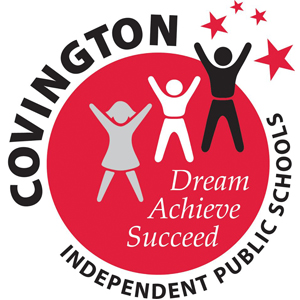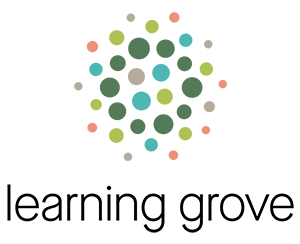First of two parts
By Mark Hansel
NKyTribune managing editor
Northern Kentucky University’s sixth president, Dr. Ashish Vaidya, officially kicked off his presidency July 2.
Prior to serving as St. Cloud State’s interim president, Dr. Vaidya served as provost and vice president for academic affairs at St. Cloud State University from 2015 to 2016. From 2010 to 2014 he served California State University, Los Angeles, as provost and vice president for academic affairs. He also served California State University Channel Islands as dean of the faculty from 2005 to 2010.
NKU announced President Vaidya as the next leader of the university in November 2017. He completed his term as interim president of St. Cloud State University in June.
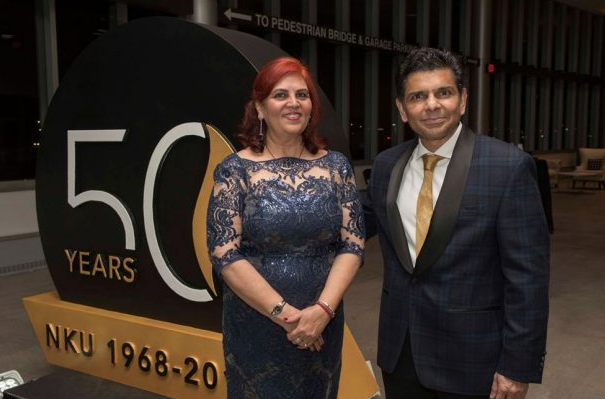
President Vaidya and his wife, Nita
In a wide-ranging, two-part interview with the NKyTribune, Dr. Vaidya discusses the transition to his new role, his initial impressions of NKU, some of the challenges facing higher education and his vision for the university.
First days and first impressions
Dr. Vaidya (pronounced vie-DEE-yuh) praised the NKU transition team for planning out his initial schedule as he moves into his new role.
He has engaged in a series of combination of on-campus tours to meet with some staff and faculty as well as some of NKU’s external constituents and key supporters.
“It’s gone really well. I’ve really enjoyed the conversations I’ve had with staff all over campus,” Vaidya said. “I’m getting a chance to see the facilities from a new perspective, but also hear from their voices, from their perspective, what they are excited about. Just meeting folks in their own offices.”
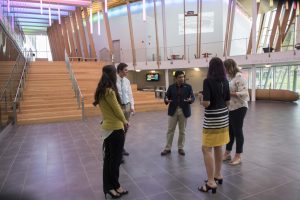
Dr. Vaidya meets with members of the NKU team on a tour of Griffin Hall. Photo credit to Scott Beseler, NKU University Photographer.
His initial impression is that NKU is an exciting, vibrant and very aspiring campus and university.
“People are generally very happy to be doing the work that they are doing,” Vaidya said. “Every office I go to, I say well, how many NKU grads do we have and it’s more than half. It speaks to the university, it speaks to the value and it speaks to the good experience that they have had, that they want to come here and work here.”
Externally, Vaidya said what he had expected has been validated, with a lot of support for what NKU has done over the years.
“They hold in high regard the work that the university is doing, especially with the graduates that are working in their companies,” Vaidya said. “If there is a complaint that I have heard it is that they need more of our graduates in the tech-based fields and other areas. They really think of us as an asset and a resource and that’s music to my ears. The challenge of that is that we need to do more to meet the needs of this region’s growing business industry sector.”
He was especially pleased by the enthusiasm for NKU in the community.
“There is a sense that we’ve had some significant challenges, but having come from multiple experiences myself, this is not specific to NKU,” Vaidya said. “It is a challenge to public higher ed in this county, writ large, especially to state universities. I have yet to come across a university that said, ‘Hey, we’re good, we’ve got enough resources.’”
On the challenges facing higher education
Vaidya said it’s hard to generalize, because each university has its own issues, but there are some that stick out.
“We are delivering America’s promise. We take many first-generation students, typically under-represented in higher ed, and we level the playing field and they go on to become successful alumni. That’s at the heart of what we do.” Northern Kentucky University President Ashish Vaidya
“To me, one of the significant challenges and some of this is our own doing, is the general sense about the value proposition for public higher ed. This is what I have seen shift dramatically,” Vaidya said. “Funding has always been a challenge because of the vagaries of state budgets. What I’ve seen shift is this notion about, ‘Why go to college, is it a good return on investment?’ We’re not even sure this is something we should be doing.’ ”
As someone who has spent his career espousing the value of higher education, this is especially frustrating for Vaidya. Students have begun to question the value of an advanced degree when there are now many employment opportunities in the current market that only require a certificate.
“So, all of that and then you find some of the recent political rhetoric around that talks about how much there seems to be a partisan divide around this, which has never been the case,” Vaidya said. “If there is one area that everybody came together on, it’s that what keeps America on the forefront of competitiveness around the world, is its higher education system. We have the best higher education system in the world and in particular, the public higher education system with our access and opportunity mission is second to none.”
He is encouraged by a recent survey from Columbia University that indicates more than 75 percent of those responding believe higher education is a good investment.
“When you talk about what we have done over the last century in terms of creating opportunity for those that are not automatically born into privilege, that’s in serious jeopardy now,” Vaidya said. “This country I think is at a crossroads with respect to whether we value economic and social mobility and providing an opportunity for all of its citizens.”
Vaidya believes institutions such as NKU can advance that value and provide that opportunity.
“We are delivering America’s promise,” he said. “We take many first-generation students, typically undere-represented in higher ed, and we level the playing field and they go on to become successful alumni. That’s at the heart of what we do. There is no doubt, in this knowledge-based, global world that we live in, the more you invest in human capital, the better off you will be, in terms of broad-based competitiveness and quality of life.”
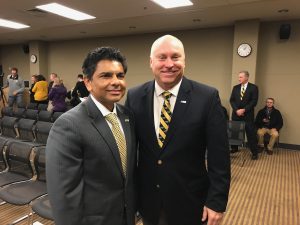
Vaidya with Northern Kentucky Chamber of Commerce President Brent Cooper as he was introduced as the sixth president of NKU in November. Vaidya said he is encouraged by the support from the community for NKU’s mission. (Photo by Mark Hansel)
Vaidya believes that education beyond high school is not just important, it is essential in today’s world.
“My hope is that every citizen has the opportunity to seek those attainment goals beyond high school,” Vaidya said.
Of course, cost has increasingly become a barrier to higher education, either directly, or through the accumulation of student debt.
“Some of it is our responsibility for not doing a better job of explaining some of the cost drivers of higher ed. We haven’t explained what drives our costs,” Vaidya said. “Are there things we could be doing better? Absolutely. People want better outcomes, better quality and lower cost – not an easy thing to deliver, so we have to work at it.”
Vaidya used the example from a previous experience as an example. While providing a tour of a simulation lab for the university’s nursing program, he said visitors were surprised at the high-tech equipment that was being used.
“If we are producing nurses, engineers, etc., this is our core business, so we can’t have substandard, mediocre people, equipment, or technology because then we would be doing a disservice to the students and graduates,” Vaidya said.
It is important, he said, for all of a university’s partners, including students, to recognize they have a responsibility to ensure a quality educational experience.
“There is an investment I feel that the individual need to make, the state needs to make and perhaps the community needs to make – this is kind of a win-win for everyone,” he said. “The student gets the benefit of getting a baccalaureate, a highly valued degree program, the state gets something because it adds to the competitive nature of your state and the region and business and industry sector gets an obvious benefit.”
The goal is to identify the appropriate amount that everybody should be contributing to that investment and get them on board.
“We have to work at affordability, which we will continue to do (but) our average student debt is less than $30,000,” Vaidya said. “We have to maintain our focus on access and opportunity at the same time making sure that we provide a quality education, because that is what’s being demanded of us.”

Unfortunately, many students either take too long to graduate, don’t graduate at all, or graduate with a degree that has not prepared them for successful career.
“That said, we could be doing a better job with retention and completion and that’s, I think, going to be a big focus for us, going forward,” Vaidya said.
He recognizes that there is a growing trend to shift from thinking about a degree program in a very siloed way, to a focus on what every undergraduate student coming out of NKU is expected to know, experience and contribute.
“There are those broad-based skills that everybody should have, critical thinking, working in a team, awareness and appreciation of multiculturalism, being able to handle information and technology, these are things you should have,” Vaidya said. “Now you need some depth and expertise in a specific field of study, knowing full well that the jobs that are being created in five years will require a whole different set.
The goal is to provide, at least at the undergraduate level, such a broad base that a person has the capacity to learn, unlearn and relearn throughout their careers because they will likely be looking at five to seven jobs or careers.
“It’s a challenge to the academy to determine how we are preparing our students for the 21st century knowing all of these things,” Vaidya said. “It’s an uncertain world, it’s a complex world, and we need to ask ourselves what’s the best we can do for our students.
Next up: The focus on drawing students from outside of the region, campus safety, Division I athletics, the Health Innovation Center and a look forward
Contact Mark Hansel at mark.hansel@nkytrib.com

















